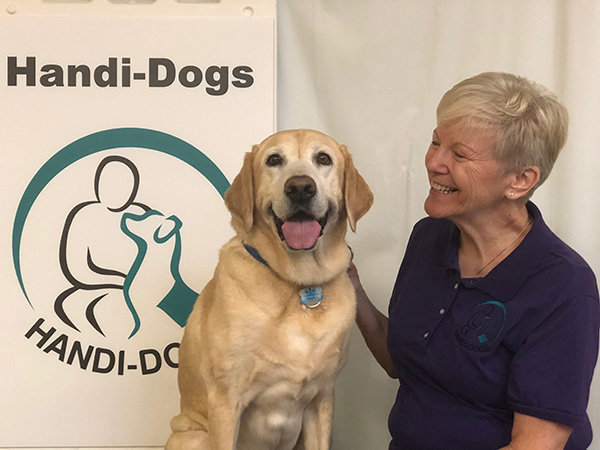Story By Claire Sheridan
Do you love dogs? Are you over 50, struggling with age-related difficulties or otherwise disabled? Have you ever wondered about training your own dog to become an assistance dog? If so, local Tucson organization Handi-Dogs just might come to the rescue for you and your dog.
Founded in 1973, Handi-Dogs is among the oldest assistance dog-training programs in the United States. Founder Alamo Reaves died in 1996; her organization has helped thousands of folks train their dogs. According to her obituary in the Tucson Citizen:
[Reaves] spent many hours seeking assistance for disabled people in Tucson and was instrumental in establishing the Handi-Dogs Pavilion in Reid Park, the first park facility in Arizona accessible to the disabled. …she was named Woman of the Year by the Tucson Metropolitan Chamber of Commerce. She also was inducted into the National Hall of Fame for People with Disabilities…
Unlike many other assistance dog-training organizations, Handi-Dogs helps students train their own dogs under the watchful guidance of professional dog trainers. Students bring dogs to weekly training lessons; they are required to live in or near Tucson. Training takes between 12 and 18 months, depending on the student’s goal; it is self-paced and customized for each student.
Marty and Luna (cover photo) have been with the organization for 8 years. Marty adopted Luna from Desert Labrador Retriever Rescue when she was 2; she had no training when adopted. The pair excelled through Handi-Dogs training, achieving Service Dog status, which includes Canine Good Citizen designation, in only 10 months. As a mobility assistance dog, one of Luna’s primary tasks is assisting Marty to stand up. The physical demands of bracing her person are no longer safe for her aging body to perform, so Luna will soon retire. In order to continue to have her needs met, Marty recently received one of Handi-Dogs’ puppies-in-training. New puppy Wilson will benefit from Luna’s training experience; although she is retiring, Luna will always be part of Marty’s family. Once a service dog, always a service dog—Luna has already started helping Wilson learn the ropes of his new job.
Handi-Dogs is the only owner-trained program to be accredited by the organization Assistance Dogs International (ADI). At the ADI conference in August, Handi-Dogs was officially recognized for the organization’s outstanding work. In order to obtain their accreditation, President JoAnn Turnbull said that Handi-Dogs “looked at everything that we are doing.” This review of operations allowed the organization to focus on making improvements where necessary to better serve its clients. According to Turnbull, the future of service dog training is likely to see an increase in owner-trained animals. Handi-Dogs is leading the way.
Turnbull also said that the organization doesn’t just focus on training dogs; Handi-Dogs trains people to train their dogs. “The empathy and flexibility of the trainers is what makes Handi-Dogs,” she said.
The cost to students is between $1200 and $1600, payable in increments. This is approximately a quarter of the actual cost of training a dog through the organization. Handi-Dogs offers services to those who need them at the lowest fee possible. As a 501(c)3 non-profit community service organization, they rely on donations and grants to offset their actual costs. The organization does not receive any government funding; all funding is provided by individuals, foundations, social and civic groups and corporations.
Although the primary objective is to help older adults and people with disabilities gain independence and improve their quality of life, the organization also serves as an advocate, educating the public about the important role of service dogs. Handi-Dogs offers several types of training including: in-home assistance dog, pet/emotional support dog, service dog, and therapy dog. Training takes place where the dogs will work; the majority is done one-on-two where a trainer meets the student dog team in a public place or at the student’s home. Students also attend group-training sessions at the Handi-Dogs training center, where interacting with other dog teams offers opportunities for different types of focused training.
If a dog isn’t appropriate for public access, or the owner doesn’t require assistance in public, Handi-Dogs offers an In-Home Assistance dog-training program. Dogs in this program may be too fearful in crowded or noisy places, but they are able to lend a helping paw in their own homes. Pet Dog training is designed to develop a well-behaved pet dog. This training may focus on resolving minor behavioral concerns such as leash pulling, jumping on people barking, or it may involve teaching the dog basic obedience skills such as sit, down, stay and come. It is also appropriate for Emotional Support Animals (ESAs). These animals are NOT the same as Service Dogs. ESAs are not granted public access rights under the Americans With Disabilities Act. There is no special certification for ESAs because the animals are not trained to perform a specific task for a person’s disability. Through their very presence, ESAs provide comfort or emotional support to their disabled person. Although ESAs do NOT have public access rights, the Fair Housing and Air Carrier Access Acts provide provisions for people with disabilities and their ESAs. People with ESAs, and proper documentation from a healthcare professional, are allowed to live in pet-restricted housing and fly on airplanes with their ESA. However, ESAs are NOTallowed in restaurants, hotels, malls or other public places that do not allow pets.
Service Dogs are specifically trained to do tasks that assist disabled persons. The Americans with Disabilities Act provides that, as an accommodation for a person’s disability, by law, a trained service dog is allowed to accompany its person in public places. Handi-Dogs trains Service Dogs for Diabetes Alert (dog alerts when a person’s glucose level is too high or low), Hearing Alert (dog alerts to ringing phones, alarms, a person’s name being called), Mobility Assistance (dog opens/closes doors and drawers, picks up and retrieves dropped items, provides stability while the person is walking, helps a person get up from a chair or the ground), and PTSD/Psychiatric Service (dog learns to stop negative behavior, lead a person outside if having a panic attack in a crowded place or to be a barrier to provide increased personal space for the person).
Therapy Dog Training offered by Handi-Dogs is designed to prepare dogs to be evaluated by other organizations that manage volunteer Therapy Dog programs. Therapy Dogs do NOT have public access rights and can only enter places with prior approval.
In all types of training, Handi-Dogs advocates positive reinforcement. They do not advocate the use any device designed to inflict pain or to punish the dog for an undesired action in any of their training.
Trainer Pam Lundy has been working with dogs for almost 40 years. During her career, dog time was usually on the weekends. Having retired two years ago, Pam now works for Handi-Dogs as a Certified Professional Dog Trainer. She received her credential through the Association of Pet Dog Trainers, which requires its trainers to keep current through continuing education. “Handi-Dogs puts joy in my heart; it is my calling. God led me to this path to help with companion dogs… to help people with complicated lives come out of their shells—this is why I do it,” she said.
Started in 2016 and funded by grants from the Zuckerman Community Outreach Foundation and PetSmart Charities, Handi-Dogs offers a program called Rescue-To-Service. Rescue dogs in need of forever homes are identified. Trainers evaluate the dogs for their potential to become service dogs; those deemed most likely to succeed are placed in specially-trained foster homes. There they receive daily training and attend weekly sessions at Handi-Dogs for 3 to 4 months. Upon successful completion, dogs are matched with a disabled adult. Teams continue to train with Handi-Dogs. Once an applicant has been approved, the current wait time is 6 to 12 months to be matched with a dog.
Figaro and Karen are a Rescue-to-Service team. Karen, a retired judge, relies on Figaro for assistance with mobility, including picking up items, climbing stairs and getting up from a seated position. Because he goes everywhere with her, Figaro also helps Karen’s pro bono legal work with the group Step Up For Justice. His presence is often a comfort to clients. Karen said, “It is reassuring to have him; he watches out for me. It is amazing what dogs can do. I can’t say enough about Handi-Dogs’ program. The training is extensive, and we keep going to classes to keep Figaro trained. He is an ambassador for the program and for service animals.”
Are you interested in becoming a foster home for the Rescue-To-Service program? After reading the job description on Handi-Dogs’ website, contact Handi-Dogs. Foster homes cannot be the potential home of the person wanting to adopt the service-dog-in-training.
Handi-Dogs training offerings are diverse; they include exposing the dog to as many real-world scenarios as dogs may encounter when they’re assisting their person. Dogs are exposed to everything from first responders in uniforms (police, fire fighters, EMTs) to riding the SunTrans bus. Much of the training revolves around building the bond between dog and handler; there are games and skills sessions, as well as training handlers how to give back to their dogs with things like emergency first aid, massage and preventative care. Additionally, handlers have the opportunity to network with each other in focus group sessions where Handi-Dogs facilitates discussions around topics including dealing with bringing your dog in public and the Americans with Disabilities Act laws.
Many of these opportunities are offered to Handi-Dogs’ students free of charge, which is only possible through the group’s fundraising efforts. Tax-deductible contributions to Handi-Dogs may be made online or at:
Handi-Dogs
75 S. Montego Dr.
Tucson, AZ 85710
Service@Handi-Dogs.org
520-326-3412
Upcoming Pet Dog Training:
Fridays 9:30-10:30 am— No class Nov. 23, Dec. 21 & 28, 2018
Saturdays 12:30-1:30 pm— No class Nov. 24, Dec. 22 & 29, 2018
Bring dog’s vaccination records & training treats
Meet Handi-Dogs at their event, DOGTOBERFEST
November 4th 10a-2p
The Gregory School, 3231 N. Craycroft Rd., Tucson 85712














